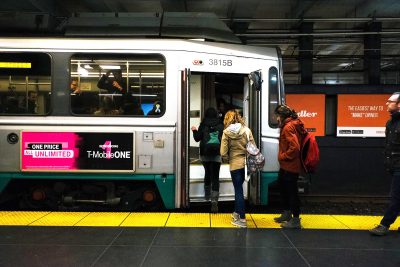
Approximately $1.6 to $1.9 million are lost annually to rear-door boarding on the Massachusetts Bay Transportation Authority Green Line’s above-ground stops, according to an MBTA study published Friday on the MBTA Data Blog.
The study was initiated in response to growing concerns by MBTA passengers about the Green Line’s all-door boarding policy, which allows passengers to board through the rear doors during peak periods, MBTA spokesperson Jason Johnson wrote in an email.
“Currently, in order to speed the boarding process, passengers are allowed to board through the rear doors at most, but not all, stops during peak periods, and rarely outside of peak periods,” Johnson wrote.
The Green Line collects about $95 million in fare revenue each year, the report stated.
Researchers, during the study, were accompanied by an MBTA official and would be situated inside the trolleys, asking passengers if they had a valid pass or had paid on the platform, the report stated.
According to the report, even during peak hours, most Green Line passengers entered the trolley through the front door and paid their fare. Likewise, approximately 69 percent of those who boarded from the rear doors swiped their passes, the report found.
In order to estimate the fare losses from rear-door boarding, MBTA personnel oversaw key boarding locations on B, C, D and E lines at morning peak hours and collected fares off-board, Johnson wrote. Findings of revenue losses in the study are being addressed by the MBTA through a variety of measures, according to Johnson.
“In the short-term, the Authority will continue off-board fare collection at the busiest times and stations,” Johnson wrote. “In the medium-term the MBTA is working to reduce spikes in per-train crowding by improving the reliability of train arrivals at each station. Finally, in the long-term the MBTA is procuring a new fare collection system that will enable payment at all doors of Green Line vehicles and proof of payment fare enforcement.”
Eugene Benson, a professor of city planning and urban affairs at Boston University, said the MBTA needs infrastructure upgrades, such as card readers at the back doors.
“[The MBTA] needs more funding,” Benson said. “They are trying to triage what problems they need to spend more money on, when in reality they just need more funding.”
Several Boston residents said fare evasion happens because of delays the T often experiences, and the MBTA should work to become more time efficient.
Nancy Dolan, 37, of South Boston, said there is not much the MBTA could do to improve its all-door policy.
“It’s always late, or there’s a disabled train that’s clogging up traffic and that makes all the trains behind it really slow,” she said. “I’m not sure how else you would do it. If we had to wait for every person to pay before getting in the train, the train would be sitting there forever.”
William Collins, 48, of Brighton, said with its increasing fares, the MBTA has a lot to improve, especially in punctuality.
“We pay too much for the T. I have a discounted monthly pass so it isn’t too bad,” he said. “The MBTA always chooses to run ‘express’ because they’re behind schedule and need to speed things up. They could be a lot more organized with their schedules.”
Luis Soto, 33, of Dorchester, said it has been challenging for MBTA officials to keep track of people who board the T amid the crowdedness of rush hours.
“It’s really hard to control who gets on or off without paying,” he said. “I know a ton of my friends who don’t end up having to pay not even because they don’t want to but because the train is to crowded to make their way to the front to pay.”















This is a solved problem. Look at other cities for methods of ticketing systems that work better. For on example, in Germany, there’s a single ticketing system on the platform. A small paper receipt is given to indicate payment if you don’t have a monthly or other pass. Occasionally, a ticket taker on the train will check for tickets, and if you’re caught without, the penalty is stiff; keeps most people honest most of the time.